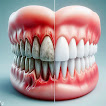By Akinrinola Akinfolabi
The market woman with the cleft lip shouts her goods. The visitor who rejects the turkey remembers the pain accompanying eating meat. The ex-girlfriend with a gummy smile. The classmate you reach for your nose mask when you spot. There's always that one person you feel should see a dentist. These everyday events are just glimpses of the silent epidemic plaguing Nigeria: the dental divide. A divide is a difference between two groups of people or two things that separate them. Oral health issues, like missing teeth and gum disease, aren't just painful, they impact lives. They affect how we eat, speak, and even interact with others. The impact is as far-reaching as the ability to sustain desired socio-economic activities1. It is no respecter of persons, rural or urban dwelling irrespective.
For most people, to make the leap to oral care as a whole part of healthcare is simply impossible. Oral care and health care are seemingly two very different concepts. Healthcare is that thing you need when you fall sick, oral care is that thing you request for when your teeth won’t let you sleep. No one ever feels oral care should be gotten until you’ve lost a tooth or are on the verge of losing one. The dental divide is not rural-urban like most divides, it's more of 'made it'-'yet to make it'. Hence, proper dental care feels like a distant luxury for many Nigerians.
The high cost of dental care is no secret to anyone. This is a major reason most people don’t see a need to visit the dentist. However, in a country where an inhaler costs 1/6th of the minimum wage, is the cost problem really exclusive to dental care? The government has succeeded to a limited extent in providing free drugs for malaria treatment via the Roll Back Malaria Program, free mosquito nets, various free vaccines, anti-tuberculosis and anti-polio initiatives but virtually nothing for better oral health. This has led to a boycott of dental services as there is virtually no means of accessing free or low-cost oral health. The health insurance system in Nigeria is also developing and doesn't have the necessary public awareness or trust yet. The vast majority have to pay out of their pockets if they want proper dental care. This has deprived people without the necessary financial capacity from affording dental care. The government needs to do more to make oral health more affordable for its citizens.
Another cause of the dental divide is the low supply of oral health personnel. There are few dental schools in the country which churn out relatively few dental practitioners. This can be attributed to the rather recent nature of dental education and the high cost of infrastructure needed to train dental surgeons. Also, there is a lack of awareness of the profession of dentistry. Whenever my secondary school held a career talk, the school management would always bring a doctor, lawyer, and engineer to speak to us. In our worlds, that was all there was. So are many other students out there today. Most people are not aware dentistry exists talkless of the numerous paths a dental education can take you. This lack of awareness stifles the pipeline of future dental professionals, perpetuating the shortage.
Poor government planning and response have contributed to the dental divide. Nigeria was a member of the World Health Organization when the Alma Ata declaration was made in 1978. The Alma Ata declaration granted international recognition to the primary health care (PHC) concept to reach the health goalfor all 2. The PHC system is the foundation of health. It allows healthcare to be delivered at the grassroots level. In Nigeria,however, although it cannot be said to be a complete failure, it hasn’t met expectations. A study has shown only 20% of the 30,000 PHC facilities across the country are working3. The PHC system lacks needed facilities, electricity, commodities, medical professionals, etc. Most PHCs cannot boast of more than one doctor, let alone a dentist. The Presidential Villa clinic was once accused of lacking paracetamol and syringes by the presidential family4. This greatly limits the dental services that can be supplied at rural areas and leaves a wide gap in oral healthcare delivery.
The inaccessibility of dentists is another cause of the dental divide. Nigeria has an estimated dental ratio of 1:53,000 5,which isn’t the worst in Africa. This discourages patients from visiting the dentist due to the long waiting times. Patients also take dental advice from unqualified persons due to the proximity, which is often more harmful than helpful.
The dental divide in Nigeria is a complex problem woven from cost, scarcity, and inaccessibility. But amidst the challenges, there's hope. Growing awareness, innovative solutions, and a renewed commitment to primary healthcare can bridge this gap, one smile at a time.
The dental divide however isn’t an unsolvable problem. The best way to tackle the dental divide is to go back to the drawing board and revamp the Primary Health Care (PHC) System. This is a very extensive program with the capacity to reach the grassroots if done correctly. The PHCs should be funded properly and equipped with adequate facilities and personnel to properly service the community.
Health insurance is also another equally viable option. The cost of healthcare is on the increase worldwide, continent irrespective. Insurance provides people with the ability to pay for what they need at a minimal fee. Proper awareness should also be created about medical insurance and the coverage should be widened to as many hospitals as possible. It should cover as many procedures as reasonably possible and should incorporate the commonest dental issues. A range of prices should also be offered for all income levels to make it even more attractive.
